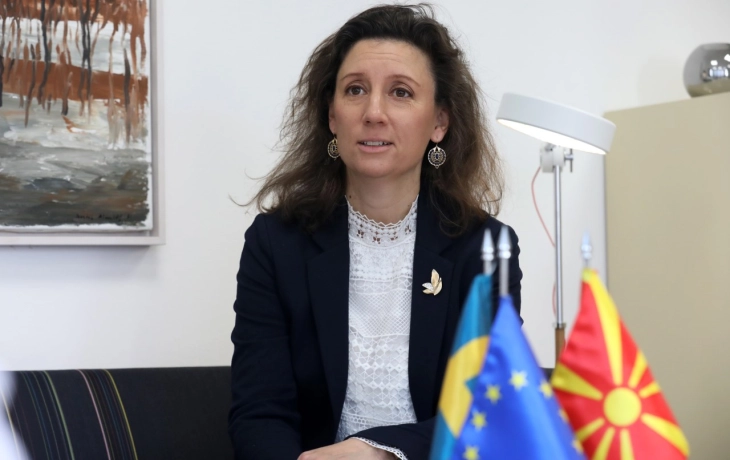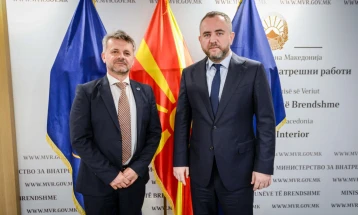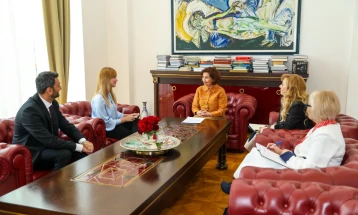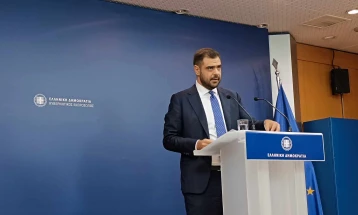Larsson Jain for MIA: EU has been very clear on need to put rule of law front and centre of reform agenda
- EU has been very clear on the need to put the rule of law front and centre of the reform agenda. Without this the country simply won’t be ready to enter the most advanced economic and political community in the world, Swedish Ambassador to North Macedonia Ami Larsson Jain said in an interview with MIA.
- Post By Silvana Kocovska
- 10:05, 9 March, 2023

Skopje, 9 March 2023 (MIA) - EU has been very clear on the need to put the rule of law front and centre of the reform agenda. Without this the country simply won’t be ready to enter the most advanced economic and political community in the world, Swedish Ambassador to North Macedonia Ami Larsson Jain said in an interview with MIA.
“One important reason why there is momentum on North Macedonia’s EU accession is the country’s own efforts in the screening process. These days, when crisis follows on crisis, good news are rare in the Council. The screening process for both North Macedonia and Albania are therefore received positively. The process will be rigorous, benchmarks must be met – but there is momentum,” Larsson Jain told MIA.
In regard to the constitutional changes, which are necessary for the country to go to the next phase of accession to the EU, she said that the constitutional changes remain a sovereign decision for North Macedonia to make.
When presenting the priorities of the Swedish EU presidency, you said that reforms are the key to moving forward on the road to the EU, and that the country proved to be well prepared and highly professional in the screening process. How do you evaluate the screening process so far?
Wide-ranging reforms are indeed key to preparing the country for EU membership. Reforms are about legislation, but also about implementation and effective enforcement of laws. Without this the country simply won’t be ready to enter the most advanced economic and political community in the world.
It will be a transformative process and it will require hard work and determination, but the reforms will also benefit the citizens of North Macedonia. Not from the day the country enters the EU, but from the day the reforms are implemented. The scale of the change means that it must come with an all of society approach.
One important reason why there is momentum on North Macedonia’s EU accession is the country’s own efforts in the screening process. These days, when crisis follows on crisis, good news are rare in the Council. The screening process for both North Macedonia and Albania are therefore received positively. The process will be rigorous, benchmarks must be met – but there is momentum.

Corruption, clientelism, the rule of law, are a cancerous wound of our society. Only eight percent of citizens have confidence in the judiciary. Citizens are not emigrating from the country only because of financial reasons, but also because of the malfunctioning of the system. The recommendations of the state Anti-Corruption Commission are not systematically forwarded. What will you tell the politicians?
The EU has been very clear on the need to put the rule of law front and centre of the reform agenda.
Corruption is corrosive to society. It weakens democracy by undermining the trust in institutions. It threatens the functioning of the economy and distorts competition. Citizens and businesses lose – and society as a whole. North Macedonia must also tackle corruption and clientelism in order to tackle the brain-drain by talented young Macedonians.
The fight against corruption, and other dimensions of the rule of law, are fundamentals of EU membership. It is no coincidence that they are also the areas that start and end candidate countries’ EU accession process.
We are following the developments in this field very closely and note both backwards steps and encouraging progress. There are no shortcuts on the road to the EU.

No matter how much progress is made in the reforms and their implementation, North Macedonia will not be able to go to the next phase of accession to the EU, if it does not implement the constitutional amendments, i.e., it does not include the Bulgarians in the Constitution, which is not ensured for the time being majority. If the constitutional amendments are not completed in parallel with the bilateral screening, by November 2023, what will that mean for the country?
The constitutional changes remain a sovereign decision for North Macedonia to make.
In this context it is perhaps worth mentioning that many EU Member States have had to make compromises on bilateral questions in order to settle issues that would otherwise hinder collaboration within the Union. The EU itself is in fact an organisation built on negotiations and difficult compromises – but the benefits by far outweigh the costs. We are truly stronger together, and the current geopolitical situation only underlines this fact.
In North Macedonia, according to the Constitution, the rights of all minority communities are respected. But what about the rest of the countries, where according to their constitution other minorities are not recognized, such as the example of Bulgaria, France… The Court of Human Rights passed several verdicts for Bulgaria regarding the Macedonian minority, which are not respected there and, in that way, deprives the human rights of the citizens of Bulgaria who declare themselves as Macedonians. Your comment on this.
Human rights are part of the fundamental values on which the European Union is based. We expect all countries that want to join us, as well as all EU Member States, to apply human rights standards.

How do you assess the current situation in Skopje-Sofia relations? We are witnessing daily incidents, which inevitably affects bilateral relations, as well as the work of the Joint Historical-Educational Commission. In an interview with MIA, Prime Minister Dimitar Kovachevski assessed that both in Bulgaria and in our country, there are individuals and groups, as well as political parties that are financed and encouraged by third parties, that is, by states, who do not want to see the region integrated into the EU. What will you say to the authorities in Skopje and Sofia?
It is not for me to evaluate the bilateral relations between these two countries.
It is however worrying to hear the messages from the Government regarding possible third party interference from individuals or groups, and there are those who have issued warnings that the Western Balkans may be a focus for forces that want to distract from Russia’s aggression on Ukraine.
My view would be that this makes it all the more important to keep a cool head and assess developments objectively, continue the bilateral dialogue as well as exchange of information, all in order to guard against any possible external interference.
The latest Eurometer survey from February of this year shows an increase in Euroscepticism. Only 49 percent of citizens think that "in general, membership of the EU" would be a good thing, which is a drop in trust in the Union from 20 percent compared to autumn 2021. How do you comment on this, has the Union failed to meet the expectations of citizens here?
It is important to acknowledge that there is a feeling of disappointment after North Macedonia’s very long wait to move forward in the EU integration process.
At the same time it is clear not only that the EU is North Macedonia’s largest trading partner but also that it offers by far the best prospects when it comes to prosperity, security and democratic values. I’m glad that some surveys also show that the perception among many respondents is that the EU is the greatest ally of this country.
I think we need to also remember that North Macedonia is already today enjoying very substantial benefits from its relationship with the EU. This will increase as EU integration moves forward. For example, Macedonians across the world were included in EU repatriation efforts during the pandemic, and the country enjoys the same rights and obligations under the Erasmus+ program for 2021-2027 as EU Member States.
Sweden also has a large bilateral reform cooperation program, aimed at supporting the EU accession process. This is a reflection of our commitment to North Macedonia and its strategic choice to pursue EU membership. So the dividends of moving towards the EU are already here and will continue, but they may not always be well-known. We in the EU should perhaps be self-critical in that we have not communicated the wide-ranging cooperation and support effectively, leaving Macedonians to feel that they are left behind, when this is not in any way the case.

The third priority of the Swedish EU presidency is the acceleration of the green transition. Given that renewable energy sources are the future of the Western Balkans region, how do you assess the country's progress in achieving the goals of the Green Agenda?
It is clear that the green transition must be speeded up, here as well as in the rest of the world, including in my own country. It is also a question of building more resilient economies, in view of the geopolitical realities.
According to the 2022 EU Commission Country Report North Macedonia has achieved a good level of preparation in trans-European networks, is moderately prepared on transport policy and energy and has achieved some level of preparation on environment and climate change. So the progress must continue, with accelerated implementation of the Green Agenda for the Western Balkans.
Through Sweden’s reform cooperation program we are contributing to this in fields such as waste management, air pollution and nature preservation.
Sweden and Finland have jointly applied for NATO membership, but your country is facing a blockade from Turkey, which has announced that it may not ratify the protocol for you and will support only Finland's membership. What are Stockholm's plans if there is a blockade and what will it mean in the context of the new geopolitical developments, after Russia's military aggression in Ukraine?
Russia’s invasion of Ukraine demonstrates a complete contempt for international law, the European security order and the most fundamental rules in the UN Charter. The security situation in Europe is the most serious since the Cold War.
Just over a year ago, Sweden had no plans to join NATO. The shift is a direct result of Russia’s full-scale invasion of Ukraine. The fundamentals of our security policy changed and a decision was taken, with strong backing in the Swedish Parliament, to leave behind 200 years of military non-alignment.
Sweden has delivered on the trilateral agreement between Turkey, Finland and Sweden. We have kept to the obligations we have agreed to, and we will contribute substantially to the strength of the Alliance. We are grateful for North Macedonia’s strong and swift support for our NATO application.

How do you evaluate the bilateral relations between Sweden and North Macedonia, is there room for improvement of economic cooperation?
I am happy to say that the bilateral relations between Sweden and North Macedonia are excellent, with a wide variety of valuable collaborations in many different fields. We are glad to be able to support the EU accession process through a strong reform cooperation program, which stood at 6 MEURO last year and is increasing this year. We work with Government, but also with a large group of civil society organisations in fields such as environment and climate change, gender equality and economic development.
We have also got a number of Swedish companies represented in North Macedonia. This year we are putting the focus in our public diplomacy on innovation, creativity, entrepreneurship and youth. This will also serve as platform for conversations on how to grow the Swedish business presence in North Macedonia, as well as on measures to counter brain-drain from this beautiful country.
Neda Dimova Prokikj
Photo by Darko Popov







